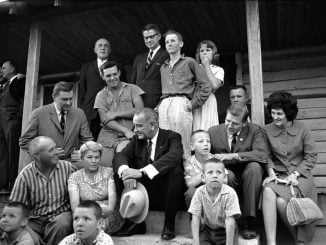
May 1
1931: The Empire State Building was dedicated in New York City; it would be the world’s tallest building for four decades.
1960: The Soviet Union shot down an American U-2 reconnaissance plane over Sverdlovsk and captured its pilot, Francis Gary Powers.
1963: Jim Whittaker became the first American to summit Mount Everest.
1971: The national passenger rail service Amtrak went into operation.
2011: President Barack Obama announced the death of Osama bin Laden
May 2
1927: The U.S. Supreme Court, in Buck v. Bell, upheld 8-1 a Virginia law allowing the forced sterilization of people in order to promote the “health of the patient and the welfare of society.”
1972: A fire at the Sunshine silver mine in Kellogg, Idaho, claimed the lives of 91 miners who succumbed to carbon monoxide poisoning.
1994: Nelson Mandela claimed victory in the wake of South Africa’s first democratic elections
May 3
1802: Washington, D.C., was incorporated as a city.
1937: Margaret Mitchell won the Pulitzer Prize for her novel, “Gone with the Wind.”
1979: The Conservative Party ousted the incumbent Labour government in British parliamentary elections.
May 4
1904: The United States took over construction of the Panama Canal from France.
1942: The Battle of the Coral Sea, the first naval clash fought entirely with carrier aircraft, began in the Pacific during World War II.
2006: A federal judge sentenced Zacarias Moussaoui to life in prison for his role in the 9/11 attacks, telling the convicted terrorist, “You will die with a whimper.”
May 5
1821: Napoleon Bonaparte, 51, died in exile on the island of St. Helena.
1973: Secretariat won the Kentucky Derby, the first of his Triple Crown victories, in a time of 1:59.4, a record that still stands.
1961: Astronaut Alan B. Shepard Jr. became America’s first space traveler.
1994: Singapore caned American teenager Michael Fay for vandalism, a day after the sentence was reduced from six lashes to four.
May 6
1882: President Chester Alan Arthur signed the Chinese Exclusion Act, which barred Chinese laborers from immigrating to the U.S. for 10 years. (The act would remain in effect until 1943.)
1889: The Eiffel Tower opened to the public as part of the Paris World’s Fair.
1935: The Works Progress Administration was established under an executive order signed by President Franklin D. Roosevelt.
1937: The hydrogen-filled German airship Hindenburg caught fire and crashed while attempting to dock at Lakehurst, New Jersey; 35 of the 97 people on board and one crew member on the ground were killed.
May 7
1915: A German U-boat torpedoed and sank the British liner RMS Lusitania off the southern coast of Ireland, killing 1,198 people, including 128 Americans, out of the nearly 2,000 on board.
1945: Nazi Germany signed an unconditional surrender at Allied headquarters in Rheims, France, ending its role in World War II.
1954: The 55-day Battle of Dien Bien Phu in Vietnam ended with Vietnamese insurgents overrunning French forces; it would be the last major battle of the First Indochina War.



